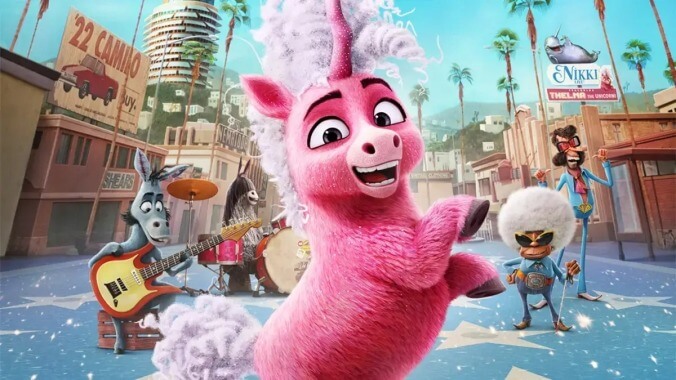Thelma The Unicorn review: If only this film were as ambitious as its protagonist
The new animated feature from the creators of Napoleon Dynamite barely manages to clear the low bar it sets for itself

Every parent knows there are generally two kinds of animated features: the ones that put in the extra work to appeal to an audience of all ages and the ones that don’t aspire to entertain anyone but the easy-to-please under-12 set. Thelma The Unicorn is, sadly, the latter. If your interest in this film is based on the reunion between Napoleon Dynamite filmmakers Jared and Jerusha Hess and Napoleon himself, Jon Heder, who voices a supporting role, don’t expect to find the off-beat spark of weirdness often present in the Hesses’ work. Thelma The Unicorn is as conventional as it gets. You know exactly where it’s going from the start, and it seldom deviates from that formulaic path.
The Netflix film is based on the picture book of the same name, as well as its sequel The Return Of Thelma The Unicorn, by Aaron Blabey. This isn’t the first time Blabey’s work has been adapted for the screen; his bestselling graphic-novel series The Bad Guys was recently turned into a not-so-bad film for Dreamworks, with a sequel due in 2025. While that film managed to capture a lot of the charm of Blabey’s books, you’d be hard pressed to find much of his Thelma in this adaptation. His distinctive cartoon style has been retooled so the characters look like every other computer-animated film from Illumination or Pixar. It’s an odd way to go for a film that’s supposed to be about staying true to yourself and defying expectations based on appearances.
Thelma (Brittany Howard) is a farm pony who dreams of making it big as a music star. She loves jamming with her band, The Rusty Buckets, alongside her donkey buddies Otis (Will Forte) and Reggie (Jon Heder), but they can’t seem to catch a break. At an audition for a musical festival called Sparklepalooza the judges dismiss them on sight, telling them they don’t have what it takes to light up a stage. Fate intervenes when a truck carrying barrels of pink paint and glitter conveniently tips over near a fence where Thelma is standing, at the exact time she’s playing around with a carrot stuck to her head, giving her the appearance of a unicorn. Almost immediately she becomes a roadside attraction, drawing gawking spectators to the farm. The more she leans into her new unicorn persona, the more the public loves her.
When Thelma gives a musical performance that goes viral she starts attracting the attention from the industry she’s always craved. On the positive end of the spectrum is music producer Peggy Purvis (Maliaka Mitchell), who is interested in Thelma’s talent and doesn’t care what she looks like (we know she means it because Peggy’s literally blind). At the other end of the business is the cartoonishly villainous Vic Diamond (Jemaine Clement), who drops his current client Nikki Narwhal (Ally Dixon) as soon as he feels the winds of popularity shifting toward Thelma, his next target for exploitation. Prompted by Vic and her own desire for fame, Thelma predictably turns her back on her old friends, and starts to lose herself in the fantasy.
In case you’re wondering, Peggy and Vic are humans. In this world, humans coexist with talking animals like it’s a totally normal thing. Even the flies talk. But like so many other under-considered elements in Thelma The Unicorn, it makes no sense when you think about it. How does the food chain work? What do the carnivores eat? How does Nikki Narwhal get to her gigs? And let’s not even get into the bizarre human fandoms that develop around these animal stars. Your mind tends to linger on questions like these when there isn’t enough happening on-screen to keep it engaged. Also, one of the supporting characters is a horse named Danny Stallion (Fred Armisen) who’s famous for his cud-chewing videos. Did anyone during production point out that horses don’t chew cud? Or that gross-out toilet humor has limited allure post-adolescence?
As the voice of Thelma, Grammy-winning musician Howard (formerly of Alabama Shakes) admirably gives her all. Her powerful vocals make the songs soar, but she also lends a vulnerability to Thelma, and a likability that keeps you rooting for her, even when she’s making questionable decisions. The only other actor who seems to be having any fun behind the microphone is Clement, who not only gets to ham it up as Vic, but gets to sing new songs written by his Flight Of The Conchords bandmate Bret McKenzie. Oscar-nominated songwriter Taura Stinson also contributed three original songs to the film. It’s not hard to tell who wrote which. The soundtrack works fine in context, but none of the numbers stick with you when it’s all over.
Somewhere, buried under all that paint and glitter, there’s a lesson to take away from Thelma The Unicorn, but it’s nothing new. The media has been telling kids that it’s what’s on the inside that counts for generations, while simultaneously promoting the opposite, and nothing has changed. The entire premise of the film is based on that being the status quo. If anything, thanks to social media (which plays a huge part in the film, despite most of the characters lacking thumbs) image tends to wins out over substance way more often. It doesn’t hurt to reiterate the message for the benefit of a young audience, but as well-meaning as it is, Thelma The Unicorn isn’t the ideal vehicle for its delivery.